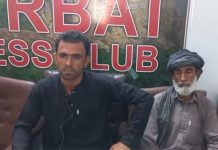The Swedish Prosecution Authority has officially closed the preliminary investigation of the death of the Baloch Journalist Sajid Hussain, on July 15, claiming that no murder had taken place.
The National Unit Against International and Organised Crime at the Swedish Prosecution Authority has officially closed the preliminary investigation of the death of Sajid Hussain. In an email to the Radio Sweden, Ulrich Alinsa, the Prosecutor in charge, had said that: “measures, including an analysis of Hussain’s home and computer, an autopsy and witness interviews of people he had contact with around the time of disappearance, had weakened any suspicion that a crime was behind his death.”
The police spokesperson, Jonas Eronen, had told media that the autopsy report of Mr Hussain has “dispelled some of the suspicions that he was the victim of a crime.” Eronen said that the possibility of murder has not been completely ruled out, the tragic death can be equally attributed to an accident or suicide.
Erik Halkjaer, the head of the Swedish branch of Reporters without Border (RSF) said: “As long as a crime cannot be excluded, there remains the risk that his death is linked to his work as a journalist.”
Sajid Hussain was an exiled Baloch journalist living in Sweden, and the antemortem chief editor of The Balochistan Times, an online newspaper commenting on and reporting human rights issues in Balochistan, like drug trafficking and enforced disappearances. Before fleeing Pakistan in 2012, Mr Hussain had been working with leading English-language dailies, including The News and Daily Times, and with international media outlets, like Reuters. Sojourning through the Gulf countries, Mr Hussain travelled to Sweden in 2017 and acquired political asylum there in 2019.
In March, Sajid Hussain went missing after boarding a train from Stockholm to Uppsala. Two months later, in April, his dead body was found in the Fyris river in the north of Uppsala. After his disappearance, Reporters without Borders (RSF) immediately called on the Swedish authorities to investigate the case and to prioritise the hypothesis that Mr Hussain was “abducted at the behest of a Pakistani intelligence agency.”
Daniel Bastard, the head of RSF’s Asia-Pacific desk, dubbed Mr Hussain’s disappearances an “enforced disappearance” and accused Pakistani military and intelligence agencies for it. RSF said that Mr Hussain’s disappearance is attributable to his work as a journalist, as most of his articles crossed the ‘red line’ drawn by the Pakistani military, and the fact the Pakistani journalists living in Europe have faced similar threats. The organisation also claimed that it possessed confidential information that a list of “Pakistani dissidents” had circulated through the Inter-services Intelligence, Pakistan’s most powerful intelligence agency.
Activists and several Indian media outlets pointed fingers at the Pakistani intelligence agencies of abducting and murdering Sajid Hussain. Gulalai Ismail, a Pakistani human rights activist, demanded that the Pakistani embassy in Sweden “should be investigated for their involvement in abduction and murder of Baloch exiled activist Sajid Hussain.” Afrasiab Khattak, a former senator, said that the criticism of Pakistani Army is a “red line” which attracts “strong arm tactics against journalists”, and that the disappearance of Mr Hussain has “raised new questions.”
Sajid Hussain’s family has not commented on the closure of the investigation of his death. Talking to a German media outlet, Mr Hussain’s brother, Wajid Baloch, had said that they have not received Mr Hussain’s body from the Swedish authorities and that they cannot comment on the case at hand. Taj Baloch, Mr Hussain’s close friend and roommate, said: [The] police have shown extraordinary laziness in this case.”
Numbers of activists say that the police have loosely imputed Mr Hussain’s death to an accident or suicide.






























